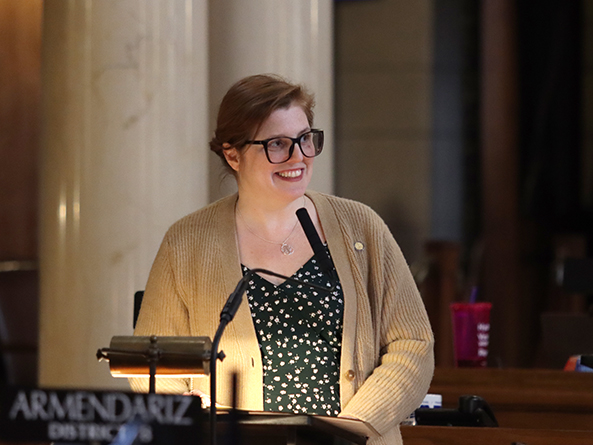Medicaid translation requirement clears first round
A bill that would require the state to provide coverage for all necessary translation and interpretation services for individuals who receive Medicaid was broadened and advanced from the first round of debate March 7.

LB62, sponsored by Omaha Sen. Machaela Cavanaugh, would require the state Department of Health and Human Services to provide the coverage and to “take all actions necessary” to maximize federal funding to do so.
Cavanaugh said she brought the bill because the managed care organizations that the state contracts with “theoretically” provide for interpretation and translation services, but are not always in compliance. Such services are covered inconsistently, she said, and often end up being paid for out of pocket.
“[The bill] is a needed step to ensure everyone is able to receive the health care they need, even if English is not their first language,” Cavanaugh said. “Language access improves outcomes and ultimately reduces health care costs.”
A Health and Human Services Committee amendment, adopted 30-0, would add provider reimbursement to the bill’s provisions. An amendment offered by Cavanaugh to fund the measure from the Medicaid Managed Care Excess Profit Fund was adopted 31-0.
La Vista Sen. John Arch supported the bill and the Cavanaugh amendment. When Medicaid fails to cover the cost of something like interpreting services, he said, those costs are shifted to everyone else who pays into the health care system — both providers and those who pay premiums.
A second Cavanaugh amendment, adopted 28-0, would add the provisions of her LB871 and require DHHS to submit an annual report to the Legislature by Nov. 1 of each year detailing current and anticipated Temporary Assistance for Needy Families program expenditures.
The report would include a description of each program or service funded by TANF, the number of people being served, total costs and expenditures and the TANF purpose met by each program or service.
For programs other than the Aid to Dependent Children program, the report would include a “clear statement” explaining how an expenditure for that program or service is more likely to help families achieve economic mobility and self-sufficiency than an increase in ADC expenditures.
The amendment also includes provisions of Cavanaugh’s LB1237, which would require a DHHS annual report on Medicaid redeterminations, including the:
• number of eligibility determinations;
• average client call duration;
• client call abandonment rate;
• number of requests for a fair hearing;
• number and percentage of applications approved and denied;
• number of case closures in the Medicaid program and Children’s Health Insurance Program and the specific reason for each closure;
• number of Medicaid program and CHIP enrollees;
• average number of days required to process applications for the Medicaid program and CHIP program; and
• rate of re-enrollment within 90 days of termination and within 12 months of termination.
The amendment was adopted 28-0 and lawmakers advanced LB62 to select file on a vote of 28-2.


